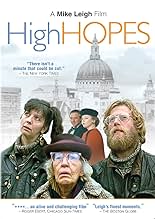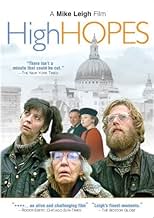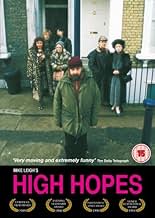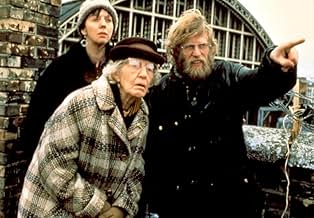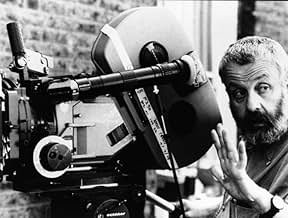Dans le Londres brumeux de la fin des années 1980, un jeune socialiste est désespéré par sa mère, ouvrière vieillissante et conservatrice, par ses amis snobs de la classe moyenne et par sa f... Tout lireDans le Londres brumeux de la fin des années 1980, un jeune socialiste est désespéré par sa mère, ouvrière vieillissante et conservatrice, par ses amis snobs de la classe moyenne et par sa femme qui ne pense qu'à fonder une famille.Dans le Londres brumeux de la fin des années 1980, un jeune socialiste est désespéré par sa mère, ouvrière vieillissante et conservatrice, par ses amis snobs de la classe moyenne et par sa femme qui ne pense qu'à fonder une famille.
- Réalisation
- Scénario
- Casting principal
- Récompenses
- 6 victoires et 6 nominations au total
- Cyril
- (as Philip Davis)
- Man in Street
- (non crédité)
Avis à la une
Director Mike Leigh is probably the closest the UK has to Woody Allen: and like Allen his films go from absolute classics to barely watchable. Here he is about as good as he ever will be - indeed there are scenes from this movie that are, in there own way, as profound and original as anything that has been put down on film.
Who else would let the camera linger on the face of an old woman just at the point of losing her sanity? Or dare to present a couple going nowhere as the centrepiece of a feature film? Or even present "success stories" (a yuppie couple) as rank and selfish? Here lower-middle-and-upper crusts are clowns, it is only a matter of levels and angles.
Indeed, Leigh never gives us anything to cling to. Nor does he want to present hope that things will change for the better. Take the central couple Shirley and Cyril (Philip Davies and Ruth Sheen). Why are they living like squatters in their own tiny flat? Why can they not buy a proper bed (they sleep on the floor) or look for somewhere better - after all they both work? Apart from the question of a child (she wants - he doesn't) they both seem happy to live in squalor. In Shirley we at least have someone who cares for other people.
The old lady - through which the story is told - is on her last legs as regards living an independent life. The house she lives in has become neglected and the area she lives in no longer contain her type of people. Her neurotic daughter is so wrapped up in her own suburban life that she does seem to realise her mother is at the point of collapse. The scene where she holds a birthday party for her aged mother is agony - not for her confused mother - but for us the viewer.
Some of the performances are a little of the top (Leigh's films let actors improvise) and I could have lived without so much of the melancholy music track that rubs everything in. But this is the only film since One Flew Over The Cuckoo's Nest that lets humour and tragedy sit side by side without blinking.
Director Leigh gets under your skin and takes you places we haven't been on film before - but I am not sure they are places I would want to go on a regular basis. He is a one-off, but I am secretly glad about that.
However Dore, who does virtually nothing, is quietly magnificent as the mother whose life has evaporated in front of her eyes and Philip Davis and Ruth Sheen are heartbreakingly real as the socialist son and the woman he loves but not enough to give her the child she craves. Indeed, Davis and Sheen give the kind of performances that seem to transcend mere 'acting' and which in a just world would be showered with prizes. (Sheen and Dore did win European Film Awards). In fact, everyone is first-rate even the caricatured neighbours and the lamentable Valerie. An uneven work, then, but when Davis and Sheen are on screen it's as good as Leigh gets.
The film is essentially a showcase for some wonderfully defined characters: marginalized counterculture Marxists Cyril and Shirley; Cyril's ultra-neurotic middle-class sister and her vulgar salesman husband; an infirm old mum; a pair of callous upscale neighbors; and an odd, occasional houseguest named Wayne. The plotting is furtive: nothing much happens over the course of the film, giving the cast plenty of room to stretch out in their roles. The characters and story lines were created by the entire cast through extensive pre-production rehearsals, but the finished film is remarkably cohesive, with acting so natural it could easily be mistaken for improvisation if it weren't so well written. The result is a film of rare and genuine emotion: it's either the gloomiest comedy ever made or a tragedy with no shortage of laughs.
Mike Leigh is a wonderful talent - long may his film-making continue! Postscript: Great news the film is now available on DVD - see http://www.hopscotchfilms.com.au!
I straight away recognised Philip Davis who also stared in Mike Leigh's 'Grown Ups' even though it was 20 years earlier that I had seen that. He looked very similar but his character, Cyril was much better tempered than Dick had been. Cyril and his partner Shirley are the only ones who seem to care about poor old Mum. They are also kind hearted enough to help out a stranger who was lost and confused. Her other daughter Valarie appears to care more about her dog and her own life. The toffee nosed couple next door would rather leave the poor old women standing out in the cold when she locks herself out and don't want anyone to get in the way of their life.
This film lets us see that having money doesn't always mean happiness. Cyril and Shirley are much more contented than their richer neighbours and sister. They are also much less selfish. I would rather have them any day
Le saviez-vous
- AnecdotesBefore High Hopes (1988), director Mike Leigh had made Bleak Moments (1971), released in 1971, and Meantime (1983), released in 1983. This gap in his filmography was attributable in part to his process for creating films: When he applied for financial backing, he did not yet have finished scripts, preferring to allow actors, once they were hired, to use improvisation sessions to create the dialogue. As a result, given the absence of a concrete script, many potential financial backers were reluctant to support Leigh's work. For "High Hopes," that spelled doom until the British TV station Channel 4 stepped in and partially funded it. The result is one of the most moving and engaging films of the 1980s and an early masterwork in Leigh's catalog.
- GaffesAfter they come back from the opera, Lætitia sings the aria "La ci darem" to Rupert, which she claims was from the opera they just saw. They proceed to talk about the characters Susanna and Cherubino. However, these characters are from The Marriage of Figaro whereas the aria "La ci darem" is from Don Giovanni.
- Citations
Rupert Boothe-Braine: Now... what made this country great was a place for everyone, and everyone in his place. And this is my place.
Meilleurs choix
- How long is High Hopes?Alimenté par Alexa
Détails
- Date de sortie
- Pays d’origine
- Langue
- Aussi connu sous le nom de
- Velike nade
- Lieux de tournage
- Stanley Passage, King's Cross, Londres, Angleterre, Royaume-Uni(apartment of Ruth Sheen and Philip Davis)
- Sociétés de production
- Voir plus de crédits d'entreprise sur IMDbPro
Box-office
- Budget
- 1 800 000 £GB (estimé)
- Montant brut aux États-Unis et au Canada
- 1 192 322 $US
- Week-end de sortie aux États-Unis et au Canada
- 27 964 $US
- 26 févr. 1989
- Montant brut mondial
- 1 192 322 $US

